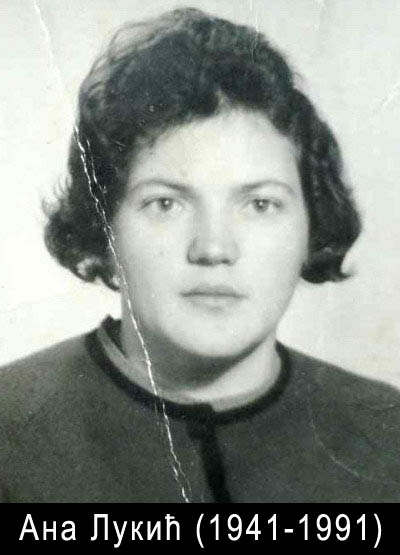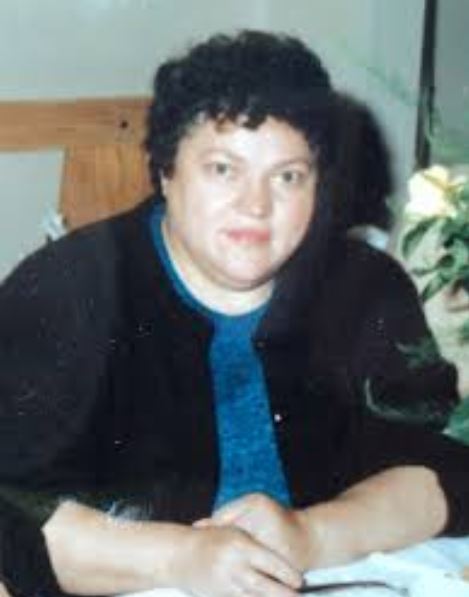Period:
Yugoslav Wars
Region:
Estern Slavonia
The Serb victim Ana Lukić - Vukovar 1991
Mixed marriages between members of different ethnic groups were once a point of pride for the former Socialist Federal Republic of Yugoslavia (SFRY).
However, those days-when such unions were considered both normal and even desirable-are now long gone.
In the 1990s, on the eve of the bloody conflict in Vukovar, being married to a Serb or a Croat became something to hide. Ana Lukić (née Maljevac), a Croatian woman, was married to Bogdan Lukić, a Serb. Together they raised four sons and lived in the home they had painstakingly built. Neither could have anticipated the horrors that would befall them in 1991.

A NEIGHBOR SAVES THE FAMILY
Despite the increasingly tense and uncertain atmosphere in Vukovar and its surroundings in the summer of 1991, Bogdan Lukić did not feel compelled to relocate his family to safety. His perspective changed when a Croatian neighbor warned him that it would be best to leave. Bogdan fled with his four sons to Subotica.
“Sometime in July 1991, when things were already escalating, a Croatian friend from the neighborhood advised me to leave,” Bogdan recounted. “He told me that house searches for weapons would begin soon.
“Although I possessed no weapons, I had heard stories from the War that if you were targeted as an enemy, they would plant evidence. That night, my sons and I stayed at various neighbors' homes in Vukovar, and the next day we traveled to Bosnia, then via Bijeljina to Subotica, where my sister lived. That was around 10 July 1991.”
The neighbor who warned him acted with integrity, despite not being close friends. “He felt compelled to tell me, as agreements were being made in his home to conduct searches. He didn't only warn me-he warned others too.” Those he told included Vlado Skledežija, who refused to leave, insisting he was innocent. Skledežija and three others later disappeared and were found dead in the Danube near Novi Sad. Their killers were never identified.
CULTURAL IDENTITY AS AN OBSTACLE
After Bogdan’s departure, Ana remained behind to protect their home. As a Croat by birth, she believed she would be safe. Newly furnished, the house became a focal point of rumors: properties being booby-trapped, possessions being seized-which prompted her efforts to defend it. However, her Croatian ethnicity did not shield her; some could not forgive her for marrying a Serb.
Employed in the administration of Vukovar Hospital, Ana found each trip to work increasingly intimidating, receiving verbal condemnation for her husband and sons fleeing to Serbia. Distraught, she eventually stopped going to work. The last time she spoke to Bogdan was by phone in early September 1991, urging him not to return, because when the time came, she too would have to leave Vukovar. However, by then leaving the city was no longer possible.
One day, a group of volunteers from Đakovo forcibly entered their home, taking valuables. Ana was hiding in the basement and could not confront them. One man later returned and raped her. That night, Ana escaped and found refuge in a shelter managed by Borovo Komerc. She remained safe for nine days; it was mid-November 1991 when the JNA tightened their siege, but Ana never survived to see freedom.
EXECUTION AT THE STATION
“Martin Sabljić was a neighbor; I knew him well-he was my son’s football coach,” recalled Bogdan. “After the war ended, he was arrested in Vukovar and tried in Belgrade in 1992. At his trial, he denied knowing me or my sons. Among papers found in my late wife’s home were military IDs, and he immediately ordered her execution. He was directly responsible.”
This information came from Olgica Gedoševich, a friend of Ana’s who testified at the trial. She recounted that Ana and another woman, Vida Jakovljević, were selected for execution. Olgica, a Russian national, was spared only when her nephew-uniformed-recognized her and interceded.
“My wife and several others were executed at the railway station in Borovo Naselje by Nikola Čibarić,” Bogdan continued. The only survivor was Dragoljub Vračarić, who also testified in Belgrade.
After hostilities ceased and the military trial concluded, Bogdan located Ana’s remains at the Vukovar cemetery, among approximately 1,200 victims. He identified her via a military pathologist’s report and photographs. Both the commander who ordered the killing and the executioner were sentenced to death in Belgrade but were subsequently released in the “all-for-all”, done in Nemetin, prisoner exchange in 1992.
“I searched for my wife everywhere after the war,” Bogdan said. “But I learned that she was executed at the railway station. During the trial, they showed me photographs and I learned she had been buried in Vukovar as an unidentified person. In March 1992, I reinterred her properly.”
Čibarić testified that he acted under orders from Sabljić and expressed regret, claiming: “Had I known she was your wife, I would not have killed her. I am sorry.”

WRONGFUL SUIT IN CROATIAN COURTS
Bogdan pursued legal redress in Croatian courts, hoping for justice. However, the case was dismissed due to statutes of limitations-even though it involved war crimes (rape and murder).
“‘Initially, I offered a settlement, but it was rejected. I filed a lawsuit in Vukovar, which referred it to Ilok. An initial ruling in my favor was overturned upon appeal, with courts ruling the case had expired. The Supreme Court upheld that decision. I then filed for revision, but that too was rejected.”
Despite clear evidence of multiple war crimes, the court invoked statutory limitations-contradicting international norms that war crimes are imprescriptible.
“To add insult to injury, I was ordered to pay legal costs amounting to 49,500 kuna (approx. €6,600), even though I lost the case. My pension is 2,500 kuna, so I attempted to pay in installments but could no longer afford it and have defaulted on the last five months. I do not know how the state will proceed next,” Bogdan said bitterly.
CONTINUED LEGAL STRUGGLE
As a member of the Association of Serbian Victims’ Families “Against Oblivion,” Bogdan has met with the Croatian Minister for Veterans, Predrag Matić.
“Matić said that it was wrong for us to incur such high costs and advised us to withdraw our lawsuits, promising the state would ‘forgive’ the debt. It’s pathetic. At the court counter, jokingly though I was in no mood, I asked what interest I would be charged if the state was forced to return the money.
The clerk said that would never happen because the verdict stood. I asked her why Bosiljka Boljkovac had not been protected by limitations even though her alleged crimes dated back 60 years, while this case was barred after only 20 years. She didn’t know how to answer,” Bogdan concluded.
Bogdan remains hopeful. He has instructed the Nobilo Law Office to prepare a case for submission to the European Court of Human Rights in Strasbourg, believing that a favorable decision could pave the way for others seeking justice for slain family members.
|
WAR AND CRIMES IN VUKOVAR 1991
|
| CRIMES |
Killing of civilians * Karadzicevo * Kriva Bara
Nikolas Demonje Street * Kozaracka Road
Battle of Borovo Selo * Vukovar * Discrimination
|
| CRIMINALS |
Marko Babic * Mile Dedakovic * Zoran Šipoš
Martin Sabljic * Nikola Cibaric * Jure Marusic
Mira Dunatov * Ante Vranjkovic * Ivica Mazar
Vinko Leko * Vlado Lulic * Damir Sardjen * Dosen
Stipo Pole * Mante Mandic * Dujmovic * Raguz
Drazen Gazo * Tomislav Josic * Turbo vod
Blago Zadro * Tihomir Purda * Bartol Domazet
Madjarevic * Tomislav Mercep * Darko Mihaljevic
Zdenko Stefancic * Filkovic * Kolak * Prgomet
204th brigade * Gnezdo * Colak * Ivica Arbanas
Sandor * Franjo Vodopija * Branko Borkovic
Plavsic * Petar Kacic * Juraj Njavro * Hosovci
Damjn Samardzic * Josip Tomasic * Velimir Djerek
Ivan Poljak * Andjelic * Jurkic * Kole Kovacic
Miroslav Sucic * Zdravko Radic * Brothers Molnar
|
| CAMPS |
Drvopromet * Nova Obucara *Borovo komerc * Luzac
Ruthenian Church * Aerodrom * Jews cementary
Police Department * Pizzeria Abazia * Eltz castle
New school * Recruitment office
Kindergarten Pcelica * Municipal basement |
| VICTIMS |
Jovan Jakovljevic * Radovan Stojsic * Ana Lukic
Mladen Mrkic * Vlado Skeledzija * Miroslav Radic
Stevan Inic * Darinka Grujic * Ljuban Vucinic
Zeljko Pajic * Milica Vracaric * Mirko Pojatic
Milenko Djuricic * Zoran Filipovic * Bosko Grbic
Ilija Lozancic * Stevo Malecki * Branko Mirjanic
Predrag Ciric * Sucevic * Ljubomir Bolic
Slavko Miodrag * Milan Vezmar * Marko Tolic
Sveto Nedeljkovic * Nedeljko Zunic
|
|
PUBLICAT.
|
Vuteks brand * Ovcara VS Dudik * Zvonko Ostojic
Milanovic and Plenkovic * Bloodsuckers of Sajmiste
Unspoken things * Autochauvinism * Terms confusion
Not admitting the crime * Vukovar through the centuries
Transcripts * Slavonian Napoleon
One-sided past * Hypocrisy in judgments
|
Author: Slavko Bubalo
Magazine Izvor no. 51
Published October 2012
Tags:
Please, vote for this article:
Visited: 677 point
Number of votes: 0
|